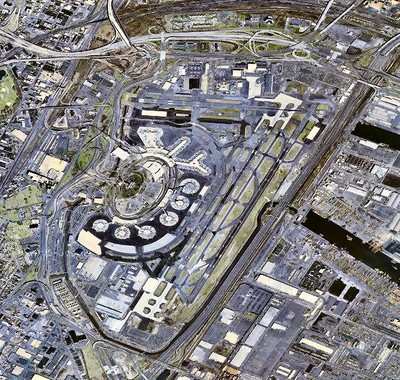Unveils $89 Million Plan To Increase JFK Capacity, Lower
Prices
 The Bush Administration will
commit almost $90 million over the next eight years to expand
capacity at John F. Kennedy International Airport, US Secretary of
Transportation Mary E. Peters announced Thursday. She also unveiled
new rules designed to lower fares, increase consumer choices and
improve service for air travelers using JFK, Newark and LaGuardia
airports.
The Bush Administration will
commit almost $90 million over the next eight years to expand
capacity at John F. Kennedy International Airport, US Secretary of
Transportation Mary E. Peters announced Thursday. She also unveiled
new rules designed to lower fares, increase consumer choices and
improve service for air travelers using JFK, Newark and LaGuardia
airports.
The DOT plans to sign a Letter of Intent in coming days,
committing the federal government to invest $89 million between
2009 and 2016 to fund a series of taxiway improvements at JFK
airport. The taxiway improvements include constructing two new
taxiways, extending or improving six others and creating new
high-speed exit taxiways.
The taxiway work will make it easier for aircraft to maneuver
between gates and the airport’s runways, cutting travel time
and limiting delays, Peters said. Construction work is expected to
begin in 2009 and would be completed by 2014.
"The best way to cut record airline delays nationwide is to
expand the limited capacity at New York's airport," Peters said.
"[But] building new taxiways or adding new runways takes time,
though, which is why we’re also putting in place measures to
cut delays and keep service vibrant over the short term."
In news that outraged airlines that serve those airports, the
DOT added those measures will include caps on the number of takeoff
and landing operations at certain times of the day, as well as a
controversial plan to auction off landing slots at those airports.
DOT says both steps are intended to cap New York-area commercial
airline traffic to realistic levels... something that, for the most
part, those airlines have refused to do for themselves.
Under its plan, DOT will limit the number of flights able to
operate at a given hour at JFK and Newark airports. Combined with
existing caps at LaGuardia airport, Peters said service at the
airport was at risk of stagnating since other competitors are
locked out of the market. She cautioned studies have found airfares
at capped airports run 11 to 15 percent higher than at comparable
airports without caps.
"In order to keep the New York aviation market open to new
services that would promote competitive fares," in Peters' words,
the Secretary also announced final rules to auction a limited
number of landing and take-off slots at each of the region’s
three airports. Under the final rules, airlines operating at JFK,
Newark and LaGuardia would receive a 10-year ownership of the vast
majority of FAA slots they currently operate, Peters said.

"Without slot auctions, a small number of airlines will profit
while travelers bear the brunt of higher fares, fewer choices and
deteriorating service," Peters said. "Slot auctions, meanwhile,
will keep flights to New York affordable, available and vibrant
while giving all airlines an opportunity to compete in one of the
world’s most popular aviation markets."
The new rules call for a gradual auctioning over the next five
years of up to 10 percent of the landing and take off slots these
airlines currently operate free of charge. Peters added the rules
also would lower the hourly operating cap at LaGuardia airport from
75 slots per hour to 71 slots per hour... a move DOT says would cut
delays by an estimated 40 percent.
Under the rule for La Guardia, existing airlines would keep 988
of the slots they currently operate. The remaining 113 slots would
be made available over the next five years by auction to airlines
interested in starting new service or expanding current operations
at the airport.

In addition, under the rule for JFK and Newark, existing
airlines would keep 1,035 of the slots they currently operate at
JFK Airport and 1,154 of the 1,245 slots they currently operate at
Newark Airport. The remaining 89 slots at JFK and 91 slots at
Newark would be made available over a five-year period for airlines
wishing to expand their current operations or start new services at
either of the airports.
Even couched by DOT as a consumer-friendly gesture, that plan
will win few friends at the Government Accountability Office,
which issued a non-binding ruling against the slot auction
plan last month. Industry opponents of the move also
lined up to criticize the DOT's plan.
 "Despite conflicting legal opinions
on whether the Federal Aviation Administration (FAA) has the
authority to auction arrival and departure slots and unanimous
opposition from the aviation industry, DOT continues to unlawfully
usurp the proprietary right of the Port Authority of New York &
New Jersey (PANYNJ)," said ACI-NA President Greg Principato.
"Airport proprietors are in the best position to manage the use of
the facilities they planned, designed, funded, built and currently
operate. Slot auctions mandated by the federal government will not
reduce delays or improve efficiency, competition or passenger
service."
"Despite conflicting legal opinions
on whether the Federal Aviation Administration (FAA) has the
authority to auction arrival and departure slots and unanimous
opposition from the aviation industry, DOT continues to unlawfully
usurp the proprietary right of the Port Authority of New York &
New Jersey (PANYNJ)," said ACI-NA President Greg Principato.
"Airport proprietors are in the best position to manage the use of
the facilities they planned, designed, funded, built and currently
operate. Slot auctions mandated by the federal government will not
reduce delays or improve efficiency, competition or passenger
service."
James C. May, president of the Air Transport Association, said
the DOT's shot across the bow leaves his organization little choice
but to pursue its legal options.
"The DOT decision patently defies the recommendation of the
Government Accountability Office (GAO), as well as the will of
Congress, by attempting to move forward with an illegal auction of
airport slots," May said. "Rather than needlessly forcing a costly
and protracted legal challenge over an ideological experiment, DOT
should follow the recommendations made by the New York Aviation
Rulemaking Committee and implement fair and practical solutions to
address delays and add needed new capacity.
"The Secretary of Transportation’s own group of key
stakeholders has proposed a clear set of solutions, while rejecting
the idea of auctions. It is past time to act on those
recommendations," May concluded.
Despite bluster from opponents, DOT and Federal Aviation
Administrator officials say their efforts are the quickest way to
address what everyone agrees is a serious problem with
overcapacity.
"The goal is simple, find every possible way to safely add as
much capacity as possible to some of the most popular airports in
the country," said Acting FAA Administrator Robert Sturgell.
"Combined with dozens of other capacity improvements we’re
making at the airport, this new investment will lead to more
flights, fewer delays and a better traveling experience for
countless flyers."

"Without slot auctions, a small number of airlines will profit
while travelers bear the brunt of higher fares, fewer choices and
deteriorating service," Peters said. "Slot auctions, meanwhile,
will keep flights to New York affordable, available and vibrant
while giving all airlines an opportunity to compete in one of the
world’s most popular aviation markets."
 ANN's Daily Aero-Linx (04.30.25)
ANN's Daily Aero-Linx (04.30.25) ANN FAQ: Turn On Post Notifications
ANN FAQ: Turn On Post Notifications Classic Aero-TV: Agile Aeros Jeff Greason--Disruptive Aerospace Innovations
Classic Aero-TV: Agile Aeros Jeff Greason--Disruptive Aerospace Innovations Aero-News: Quote of the Day (04.30.25)
Aero-News: Quote of the Day (04.30.25) ANN's Daily Aero-Term (04.30.25): Expedite
ANN's Daily Aero-Term (04.30.25): Expedite







